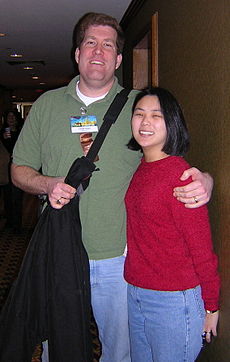Chad Orzel
Chad Orzel | |
|---|---|
 Chad Orzel & Kate Nepveu, 2006 | |
| Nationality | United States |
| Scientific career | |
| Fields | Atomic, molecular, and optical physics |
| Institutions | Union College |
Chad Orzel is a popular science author, noted for his books How to Teach Quantum Physics to Your Dog (also called How to Teach Physics to Your Dog) which has been translated into 9 languages, and How to Teach Relativity to Your Dog.[1][2]
Background
Chad was born and raised in central New York state, near Binghamton. After attending Williams College, he spent two years as a post-doctoral researcher at Yale University, studying quantum mechanical effects in Bose-Einstein Condensates.[2][3] He received his Ph.D. in Chemical Physics from the University of Maryland, College Park under Nobel Laureate William Daniel Phillips. He is an associate professor in the Department of Physics and Astronomy at Union College, where he specializes in atomic, molecular, and optical physics.
Writing career
In addition to teaching and doing research at Union, he maintains the physics-oriented blog Uncertain Principles as part of the ScienceBlogs project run by SEED magazine.[4] He published his first book, How to Teach Quantum Physics to Your Dog in 2009. The book and its sequel How to Teach Relativity to Your Dog explain scientific concepts using a fictionalized version of Orzel's dog as an audience surrogate.
Personal life
He lives in Niskayuna, New York with his wife, Kate Nepveu, their two children, and their dog Emmy.[3]
Publications
- Orzel, Chad, "How to Teach Physics to Your Dog". 2009. ISBN 1-4165-7228-7
- Orzel, Chad, "How to Teach Relativity to Your Dog". 2012. ISBN 0-4650-2331-2
- Orzel, Chad, "Eureka! Discovering Your Inner Scientist". 2014. ISBN 978-0-465-07496-9
- 2018 Pseudoscience: The Conspiracy Against Science "Scientific Failure as a Public Good; Illustrating the Process of Science and Its Contrast with Pseudoscience":MIT Press: edited by Allison B. Kaufman, James C. Kaufman: ISBN 9780262037426[5]
References
- ^ http://dogphysics.com/book_info.html
- ^ a b Contemporary Authors vol. 339, 2013. (available online as part of Gale's Literature Resource Center [1]
- ^ a b About Chad
- ^ "Uncertain Principles". ScienceBlogs. Retrieved 31 July 2015.
- ^ Bigliardi, Stefano (2019). "The Advocates of Pseudoscience Are Not Monsters - but Pseudoscience Is". Skeptical Inquirer. 43 (6). Center for Inquiry: 58–59.
